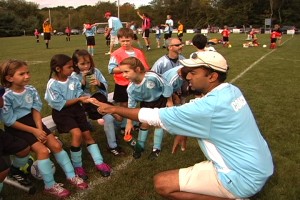“With Ocean State [Soccer School], I thought it was such a great community that I was part of. I was allowed to develop that core group of people with whom I could grow from childhood into adulthood…”
For the past three decades it has been a jewel in North Kingstown where boys and girls of all ages play soccer on 50 bucolic acres right in the middle of town. The Ocean State Soccer School, located in the heart of North Kingstown, celebrates its 30th anniversary this year. The league began in 1983 with 50 players, and this year will register nearly 1,400 for both recreational and competitive soccer, playing both spring and fall.
“We’re an all-volunteer organization, so it takes a lot of hard work and a lot of good people to keep it going,” said John Montanaro, who became president of the league’s board of directors in the summer of 1999 after coaching his own three children beginning in the mid-’90s.
Ocean State is one of only two soccer organizations in Rhode Island that owns its own land – a total of 50 acres that include fields directly adjacent to Stony Lane – and a new set of fields in the back developed several years ago.
The league rented the fields for 16 years for a nominal amount, then had the opportunity to buy the property. The board mobilized, putting together a strategic plan to buy the land, wondering how it would finance the asking price of $300,000. Montanaro says the league eventually secured funding from the Champlin Foundation and the Nature Conservancy, as the acquisition involved both recreation and preservation. A $275,000 grant and a donation by the owner back to Ocean State of $25,000 made it all happen.
So what makes Ocean State different from other soccer leagues? In addition to owning its own property, the league accommodates requests for players to be paired up with friends on a team. It’s a monumental scheduling task, considering there are 66 teams across 11 divisions in the recreation league alone.
Ocean State runs a competitive league for older players and has a referee training program. Scholarships are available for those who need financial help. And there is a major emphasis on starting early, as young as age 3. With the youngest kids, the player-to-coach ratio is usually about 7 to 1.
“I’m not aware of any other program that actually forms little teams,” Montanaro said. “And we do it partially for socialization for these kids, not only to get them activity physically, but at that young age, they’re just starting to learn how to communicate.”’
Kayla Pelletier, a captain on this year’s girls soccer team at North Kingstown High School, started playing for Ocean State when she was 5. We caught up with her several hours before she led her team into a playoff game against Cumberland.
“With Ocean State, I thought it was such a great community that I was part of. I was allowed to develop that core group of people with whom I could grow from childhood into adulthood,” Pelletier said.
Shelagh Michaud, who has a daughter in the league, has coached the past four years. “My goal was always that they have fun,” she said. “And then I just hoped they’d learn something.”’
But with some life lessons along the way.
“We had a couple of weaker players and I had some very strong players and they were taking over. I said, `No, you can’t do that. You have to work as a team. This is a team sport. It’s not an individual sport.’”
The league also looks beyond its own fields. On the last weekend of the season, it held a food drive and a soccer recycle program begun by two former players in 2010. Christiana Layman and her sister Cassandra, now a freshman in college, grew up playing for Ocean State. They collect old uniforms and cleats and send them to Haiti and other places in need.
Despite its size, the league has the feel of one big family. Many weekends the families hang out before and after the games to catch up with friends. And while 80 percent come from North Kingstown, players from a total of 18 communities registered this year, some coming from Lincoln and Providence.
“We’re here for the kids and we’re trying to teach the kids life lessons, like to be future volunteers and future leaders in the community. That’s what it’s all about,” Montanaro said. “That we made a positive difference in the life of a child who’s come through our program.”
If you know of a person or organization who you think deserves the Spotlight, send an email to info@hummelspotlight.org
